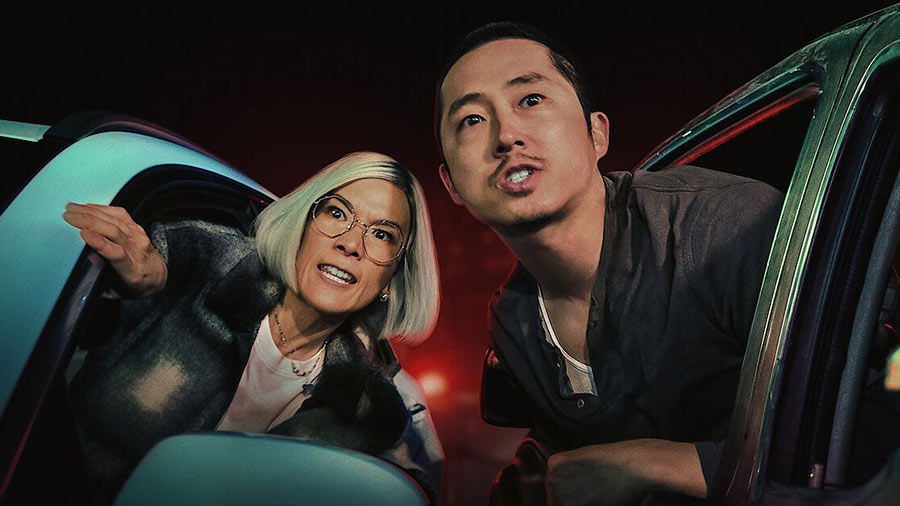‘Everything fades, nothing lasts, we’re just a snake eating its own tail.’
Beef, a series by Netflix and A24, is a riveting new dark comedy about a road rage that progresses from a mindless case of street anxiety to a philosophical commentary on parenthood, relationships and life. The story is about the “beef” between two strangers, Amy Lau (Ali Wong) and Danny Cho (Steven Yeun), who get involved in a road rage incident that turns their lives upside down. Unravelling the calamity of the mind in the lives of these two characters, creator Lee Sung Jin’s brainchild is a show that questions the meaning of happiness, family and the very grains of our existence.
The story follows the vicious rivalry between Amy and Danny and their pettiness in the aftermath of the road rage. The rage, as it turns out, is induced by the anxiety of life rather than that of a street feud. Imbued with a sense of the cat-and-mouse thrill similar to Liz Feldman’s Emmy-nominated series Dead to Me, and a satirical sting previously seen in Oscar-winning films Parasite and Everything Everywhere All at Once, Beef is now trending on Netflix and has already been submitted to the Emmys. The cinematography is peak A24 with its Midsommar-like trippiness towards the end of the series and the soundtrack will have you gaping wide whether you are a System of a Down or a Bjork fan.
Beef puts behind the Western way of portraying Asians as tech experts or karate kids
Danny is a contractor who is barely making ends meet and aspires to make his parents in South Korea proud. Amy is a successful entrepreneur with a history of parental trauma who has everything in life except a happy marriage. Amy’s family comprises her husband Joji and her daughter June, while Danny only has his brother, Paul, in an apartment from where their parents were evicted. Joji is an artist fraught with insecurities who gives out advice on happiness but is himself empty within, while Paul has been roadblocked from achieving his dreams.
The beef between Danny and Amy rips apart their lives and they are no longer the same individuals at the end of the series. The dynamic between the characters makes it one of the few shows where it is possible to root for people even if you hate them, simply because their actions and motivations can be explained, if not always justified.
The cast is entirely Asian with a few non-Asian side characters. It is rare to see the portrayal of an Asian man on an English show who has not figured out everything in life. Danny Cho is a struggling Asian who is trying to make it through the American dream. He is not your usual loner, nor is he trying to live up to his heritage. He is just another man trying to sustain his business, borrowing money from other people and using devious means to survive.
In 2023, when there is an increasing influx of Asian representation in popular media, this show has the most well-rounded and realistic Asian characters seen in some time. With Beef, we have put behind the Western way of portraying Asians as tech experts or karate kids.
It’s a show about broken people breaking other people
Shown in flashbacks, Beef parodies Asian ways of parenting and how it induces trauma in adulthood. Both Danny and Amy have grown up with Asian parents who have had their ways in breaking them emotionally. The show is an artistic depiction of how emotional unavailability, parental absence and heated conversations impact children while growing up. Beef questions the prevalent conditioning of love in Asian households where love should be unconditional. In the end, it becomes a show about broken people breaking other people.
Another attention-worthy aspect of Beef are the episode titles. Each contains an abstract piece of artwork and a quote. Beef creator Lee Sung Jin has referenced 10 literary and cinematic works in the title artworks to paint a picture of the berserk behavior of the characters. Influential words by poets, writers and film directors like Sylvia Plath, Franz Kafka and Ingmar Bergman give the episodes their names. Moreover, the show highlights the timeless quality of art by implying that it should not be monetised. Amy’s husband Joji refuses to sell his artworks because he does not believe in putting a price tag on art (interestingly, Joseph Lee, who plays Joji, is an established visual artist in real life as compared to the struggling artist in the series).
The title of Episode 3 alludes to Plath’s poem Elm, where she writes about a dark thing within her that cries at night for love. This quote is perfect to describe the state of mind of the two lead characters. Both Danny and Amy believe that their dreams are attainable only if they get rid of the darkness within. Their need for long-hankered revenge is eventually fulfilled, and yet, they feel hollow.
The thrill in the series will keep you on tenterhooks and guessing until the very last episode. With a tinge of dark comedy, Beef is hilarious and dead serious at the same time. It is highly ironic as to how a case of senseless road rage turns into a revenge that has lethal consequences. Hence, the title of the show has manifold meanings. As compared to other movies in the same genre like Unhinged (2020) and Duel (1971), Beef unfolds as a social commentary and parody underneath the veneer of rage-fuelled drivers.
Beef gradually becomes a work in the existentialist genre, too, where the characters use revenge as a force for giving meaning to their existence, which makes it one of the most unconventional entertainers you are likely to find right now. Whether or not your therapist recommends it, you should definitely give this anxiety-ridden, mind-buckling series a watch.










